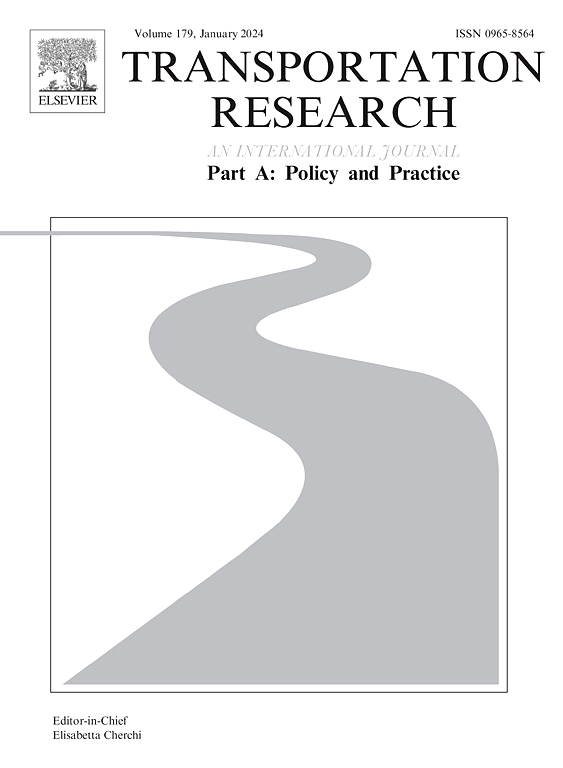社会影响和目标框架在形成绿色出行偏好中的相互作用:出行目的和陪伴的调节作用
IF 6.8
1区 工程技术
Q1 ECONOMICS
Transportation Research Part A-Policy and Practice
Pub Date : 2025-09-20
DOI:10.1016/j.tra.2025.104681
引用次数: 0
摘要
绿色出行是治理空气污染的基石。深入了解居民绿色出行偏好的决定因素对其成功实施至关重要。现有的研究倾向于强调个人特征、情绪和预先存在的观念对绿色旅行偏好的直接影响。然而,它往往忽视了社会影响塑造个人对绿色旅行选择的看法和理解的关键互动过程,从而模糊了旅行偏好的关键机制。本文结合社会影响理论和目标框架理论,提出了一个扩展的刺激-有机体-反应模型,考察了社会影响对居民绿色出行偏好的影响,具体包括政府政策、人际影响、从众效应和模仿效应。本文进一步将旅行目的和陪伴的调节作用纳入到模型框架中。该模型使用SEM模型和来自1153名中国受访者的调查数据进行实证验证。研究发现,政府政策、人际影响、从众效应和模仿效应对居民绿色出行偏好有显著影响。此外,本文还揭示了收益、享乐和规范性目标框架在社会影响与绿色出行偏好之间的关系中起中介作用。居民出行目的和陪伴的调节作用也在模型中得到证实。在此基础上,本文提出了差异化和多渠道的政策改进,使政府能够制定有说服力的策略来提高城市居民的绿色出行意愿。本文章由计算机程序翻译,如有差异,请以英文原文为准。
Interplay of social influence and goal-framing in shaping green travel preferences: the moderating role of travel purpose and companionship
Green travel is a cornerstone in combating air pollution. Gaining insight into the determinants of residents’ green travel preferences is crucial for its successful implementation. Existing research tends to emphasize the direct influence of personal traits, emotions, and pre-existing perceptions on green travel preferences. However, it frequently overlooks the critical interactive process whereby social influences shape individual perceptions and comprehension of green travel options, thereby obscuring a critical mechanism underlying travel preferences. This paper integrates Social Influence Theory and Goal-Framing Theory to propose an expanded Stimulus-Organism-Response model, examining the effects of social influences, specifically including government policy, interpersonal influence, bandwagon effect, and imitation effect on residents’ green travel preferences. The paper further incorporates the moderating effect of travel purpose and companionship into the modeling framework. The model was empirically specified using the SEM model and survey data from 1,153 Chinese respondents. Our findings reveal that government policy, interpersonal influence, bandwagon effect, and imitation effect significantly shape residents’ green travel preferences. Moreover, the paper uncovers that gain, hedonic, and normative goal frames mediate the relationship between social influence and green travel preferences. The moderating effect of residents’ travel purpose and companionship is also confirmed in our models. Drawing on these insights, this paper suggests differentiated and multi-channel policy improvements, enabling governments to formulate compelling strategies to enhance urban residents’ green travel willingness.
求助全文
通过发布文献求助,成功后即可免费获取论文全文。
去求助
来源期刊
CiteScore
13.20
自引率
7.80%
发文量
257
审稿时长
9.8 months
期刊介绍:
Transportation Research: Part A contains papers of general interest in all passenger and freight transportation modes: policy analysis, formulation and evaluation; planning; interaction with the political, socioeconomic and physical environment; design, management and evaluation of transportation systems. Topics are approached from any discipline or perspective: economics, engineering, sociology, psychology, etc. Case studies, survey and expository papers are included, as are articles which contribute to unification of the field, or to an understanding of the comparative aspects of different systems. Papers which assess the scope for technological innovation within a social or political framework are also published. The journal is international, and places equal emphasis on the problems of industrialized and non-industrialized regions.
Part A''s aims and scope are complementary to Transportation Research Part B: Methodological, Part C: Emerging Technologies and Part D: Transport and Environment. Part E: Logistics and Transportation Review. Part F: Traffic Psychology and Behaviour. The complete set forms the most cohesive and comprehensive reference of current research in transportation science.

 求助内容:
求助内容: 应助结果提醒方式:
应助结果提醒方式:


